|
|
|
Sort Order |
|
|
|
Items / Page
|
|
|
|
|
|
|
| Srl | Item |
| 1 |
ID:
134088


|
|
|
|
|
| Publication |
2014.
|
| Summary/Abstract |
One reason why Europe went to war in 1914 is that all of the continental great powers judged it a favorable moment for them to fight, and all were more pessimistic about postponing the fight until later. Not only is this historical paradox an interesting puzzle in its own right, but it sheds light on what is arguably the reigning theory of the causes of wars in general: James Fearon's rational bargaining theory. None of Fearon's three main mechanisms-private information, commitment problems, or indivisibility of stakes-can explain the paradox of the universal, simultaneous view of 1914 as a favorable year for war. Two mechanisms that play a marginal role in his analysis, however-bounded rationality in multidimensional power assessments and attempts to mitigate power shifts through coercive diplomacy-help to explain how Europe's powers became trapped in a choice between war now and war later. These mechanisms were set in motion by background strategic assumptions rooted in the culture of militarism and nationalism that perversely structured the options facing Europe's political leaders in 1914. Whereas Fearon's theory assumes that states are paying equal attention to all relevant information, in 1914 each power's strategic calculations produced disproportionate levels of self-absorption in its own domestic concerns and alliance anxieties.
|
|
|
|
|
|
|
|
|
|
|
|
|
|
|
|
| 2 |
ID:
193262
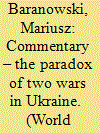

|
|
|
|
|
| Summary/Abstract |
The central thesis of this commentary focuses on the paradox of two wars occurring in parallel with Russian aggression in Ukraine. It is not just that—in addition to military action—there is a geopolitical tsunami and its consequences in the form of a possible food crisis, mass migration, or an already open energy war. The paradox relates to the fact that a potential Ukrainian victory could have adverse effects on the welfare of European countries as a consequence of the embargo on Russian hydrocarbons and the need to replace them (assuming there is no return to the ancien régime before the Russian aggression of February 24, 2022). The defeat of the Ukrainians, on the other hand, could lead to a so-called “new opening” and a gradual return to the import of Russian energy resources (which, although they will not obtain the pre-war volume, will provide energy stability for Europe in a period of diversifying contracts and developing investments in renewable energy sources).
|
|
|
|
|
|
|
|
|
|
|
|
|
|
|
|
| 3 |
ID:
114830
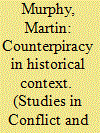

|
|
|
|
|
| Publication |
2012.
|
| Summary/Abstract |
This article identifies the salient lessons from three specific periods-the Graeco-Roman, Atlantic piracy and its extension into the Indian Ocean during the early Seventeenth Century, and piracy off China during the Ch'ing dynasty-that can most usefully inform the counter-piracy effort off Somalia. It makes the point that piracy's sinuous character has always given rise to conceptual and definitional difficulties; but that while law has had an important voice in piracy matters since Roman times it has never been the only voice. It suggests that modern pirate hunters, by treating piracy as akin to a domestic criminal activity, have shackled the effectiveness of violent suppression which their historical predecessors found so useful, while at the same time undervaluing the fundamental roles of politics and economics in piracy formation and the continuous struggle to make the seas safe for legitimate commerce.
|
|
|
|
|
|
|
|
|
|
|
|
|
|
|
|
| 4 |
ID:
156151
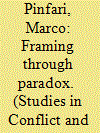

|
|
|
|
|
| Summary/Abstract |
This article presents and analyzes the “Obama supports terrorism” campaign, which was launched in Egypt in late June 2013 and was instrumental to the framing of some Islamist groups as terrorist both before and after the 3 July 2013 coup. The analysis of the visual material of the campaign highlights its reliance on various Western discourses from the War on Terror, including some whose religious and racial content is an odd fit for a non-Western, Muslim country like Egypt. Yet, despite the lack of a clear and unified causal narrative to justify such framing, the success of the campaign was crucially aided by the symbolic and rhetorical power its slogan, which provided a credible “schema of interpretation” for its supporters.
|
|
|
|
|
|
|
|
|
|
|
|
|
|
|
|
| 5 |
ID:
133943
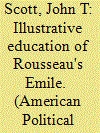

|
|
|
|
|
| Publication |
2014.
|
| Summary/Abstract |
Rousseau's mission as an author was to make his readers see what he saw in his philosophical "illumination," yet his task is a paradoxical one, for he must persuade his readers that they are deceived by what they see before their own eyes and must learn to see anew. In order to transform the perspective of his reader, Rousseau throughout his works uses visual imagery and rhetorical devices invoking vision that represents both the correct view of human nature and virtue and the obstacles to learning to see ourselves properly. As a former engraver's apprentice, he was particularly interested in educating his reader through actual images such as frontispieces or illustrations. The aim of this article is to offer an interpretation of the engravings that illustrate Emile, or On Education, in order to investigate how Rousseau educates his reader through challenging the reader's preconceptions concerning human nature and replacing traditional exemplars of human nature and virtue with a new exemplar seen in his imaginary pupil.
|
|
|
|
|
|
|
|
|
|
|
|
|
|
|
|
| 6 |
ID:
183699
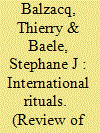

|
|
|
|
|
| Summary/Abstract |
The performance of ritual and the ritualisation of performance are the two main theoretical repertoires of ritual study in international politics and beyond. However, they also escalate tensions between those who insist on ritual's ability to operate by virtue of participants’ presence and those who believe that global networks of media call for a representational turn, which must tie participants and audiences across borders. Should we fail to understand how these distinct theoretical repertoires interact, it would be difficult to study international ritual, identify its functions, and trace its effects. Anchored in the sociology of ‘social occasions’, this article weaves ritual's patterns, properties, and resources into a coherent analytical framework. The framework enables us to better to grasp how actors move between/within different worlds (ritual and performance) and to what effects. The comparative study of two post-terrorism ritual occasions (the 2011 Rose March in Oslo and the 2015 Republican Marches in France) illustrates the usefulness of this theoretical proposition and its related framework.
|
|
|
|
|
|
|
|
|
|
|
|
|
|
|
|
| 7 |
ID:
148136
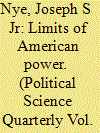

|
|
|
|
|
| Summary/Abstract |
Discusses the paradox of the United States having unparalleled military power, yet being unable to impose its will unilaterally on either its allies or its antagonists. He explains clearly why America must adopt a more cooperative engagement with the rest of the world.
|
|
|
|
|
|
|
|
|
|
|
|
|
|
|
|
| 8 |
ID:
087947
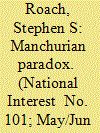

|
|
|
|
|
| Publication |
2009.
|
| Summary/Abstract |
THE CHINESE word for crisis, weiji, includes elements of both danger and opportunity. This symbolic meaning has taken on especially great significance in recent years. The emergence of modern China as a global economic power can, in fact, be dated to the nation's willingness to seize critical moments of adversity. That was very much the case during the Asian financial crisis of 1997-98, which marked a critical turning point in the ascendance of China as a major economic power. And it could also be the case today.
But there is an important catch: unlike earlier crises, it is not altogether clear that China senses the gravity of the current danger. That leaves it caught in something much closer to denial-making it difficult to seize the opportunity that peril can provide.
|
|
|
|
|
|
|
|
|
|
|
|
|
|
|
|
| 9 |
ID:
140174
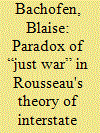

|
|
|
|
|
| Summary/Abstract |
In the Social Contract, Rousseau declares that he has given up the idea of discussing the “external relations” of states. Yet numerous texts—including a recently reconstituted work about the law of war—show that he thought very seriously about the question of the nature and origin of war and of the possibility of making war subject to the rule of law. Rousseau, in contrast to Hobbes, links war's appearance to that of the sovereign states; the state of war is therefore the necessary result of international relations. Moreover, he considers the international law as chimerical. How can he then conceive a non-utopian theory of “just war”? My hypothesis is that his conception of the law of war is deduced from principles of internal political law and arises from pragmatic necessity. The state that discredits itself in its manner of waging war weakens itself while believing that it is reinforcing itself.
|
|
|
|
|
|
|
|
|
|
|
|
|
|
|
|
| 10 |
ID:
163915
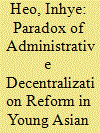

|
|
|
|
|
| Summary/Abstract |
It is generally perceived that administrative decentralization reform in young democracies is a promise to improve democracy from below. Yet, in terms of democratic development, the impact of this process is ambivalent, and can be described as a paradox of reform. This article argues that preemptive countermeasures that offset problems predicted to emerge as the reform proceeds should be formulated as part of the reform through introducing a preventive policy paradigm in the area of democratic reform policy. This is to alleviate or prevent the creation of the paradox and to contribute to democratic development through enhancing people’s satisfaction with the newly democratized government. To this end, this study examines administrative decentralization reform in South Korea and Indonesia and uncovers these reforms’ paradoxes. These two cases are particularly worthy of study, since their young democratic governments lack countermeasures against predictable reform problems, intensifying the paradox. I argue that the implications drawn from these two cases for methods of enhancing democratic development in other young democracies are worth heeding.
|
|
|
|
|
|
|
|
|
|
|
|
|
|
|
|
| 11 |
ID:
084606


|
|
|
| 12 |
ID:
113825
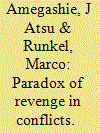

|
|
|
|
|
| Publication |
2012.
|
| Summary/Abstract |
The authors consider a two-period game of conflict between two factions, which have a desire for revenge. It is shown that, in contrast to conventional wisdom, the desire for revenge need not lead to escalation of the conflict. The subgame-perfect equilibrium is characterized by two effects: a value of revenge effect (i.e., the benefit of exacting revenge) and a self-deterrence effect (i.e., the fear of an opponent's desire to exact revenge). The authors construct examples where the equilibrium is such that the self-deterrence effect paradoxically outweighs the value effect and thereby decreases the factions' aggregate effort below the level exerted in the no-revenge case. This paradox of revenge is more likely, the more elastically the benefit of revenge reacts to the destruction suffered in the past and the more asymmetric is the conflict. The authors discuss the implications of revenge-dependent preferences for welfare economics, evolutionary stability, and their strategic value as commitment devices.
|
|
|
|
|
|
|
|
|
|
|
|
|
|
|
|
| 13 |
ID:
148748
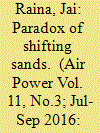

|
|
|
| 14 |
ID:
086321
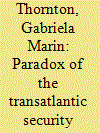

|
|
|
|
|
| Publication |
2008.
|
| Summary/Abstract |
The transatlantic security project - with its central focus on the North Atlantic Treaty Alliance (NATO) - was by many accounts a phenomenon that occurred because of the bipolarity of the international system during the Cold War. The main contention of this article is that the foundation of the transatlantic security project was built on a paradox. The transatlantic security project may have been the right response to the security challenges of the Cold War, but the project, as conceived originally, was not able to meet the new challenges brought by the fall of the Soviet Union. With the Cold War gone, the nature of the power relations between the main pillars of the transatlantic relationship, the US and the EU, started to change. Therefore, what best defines the idiosyncratic existence of the transatlantic space de notre jours? In order to answer this question, this article is structured as follows. First, I analyse the paradox of the transatlantic security project. I then explore the relationship between the newly created EU institutions and NATO. Third, I claim that the Clinton administration tried to solve the transatlantic paradox by taming European power, that is, by making efforts to tie the EU's security institutions into NATO. By contrast, the Bush II presidency has tried to divide European power. I conclude by arguing that references to the transatlantic relationship, as to a monolithic bloc - a way in which it was conceived and referred to during the Cold War - no longer reflect the new transatlantic reality. A new transatlantic security space has been emerging; a more fragmented space - a space invested with a new dynamic, in which actors' security and geo-political concerns have started to diverge.
|
|
|
|
|
|
|
|
|
|
|
|
|
|
|
|
| 15 |
ID:
139474
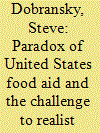

|
|
|
|
|
| Summary/Abstract |
This article analyzes United States food aid from 1981-2009, examining the primary donor motivations and the overall effects on the recipients.
|
|
|
|
|
|
|
|
|
|
|
|
|
|
|
|
| 16 |
ID:
174260


|
|
|
|
|
| Summary/Abstract |
This paper examines Mahmoud Darwish's exploration of the political, geographical, existential, and metaphysical dimensions of displacement, banishment, and statelessness in his 2005 lyrical epic “Exile.” The paper offers an analysis of Darwish's treatment of dialectic, heteroglossia, the juxtaposition of the national and the existential, and conflicting temporalities, as well as political uncertainty and metaphysical fear. With particular reference to the paradoxical portrayal of space in “Exile”—the juxtaposition of the near and far, real and illusory, localized and dispersed—I also examine the ways in which Palestinian identity, as narrated in this poem, is destabilized and dispersed by what Michel Foucault calls “heterotopic space.”
|
|
|
|
|
|
|
|
|
|
|
|
|
|
|
|
| 17 |
ID:
093171
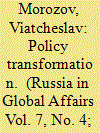

|
|
|
| 18 |
ID:
176658
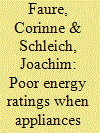

|
|
|
|
|
| Summary/Abstract |
Conveyance, i.e., leaving one's appliance in the dwelling when moving out, shortens the expected length of ownership of an appliance and may therefore lead to the purchase of less energy-efficient appliances. Employing a demographically representative survey in Spain, this paper uses statistical-econometric analyses to explore the effects of conveyance on stated adoption of energy-efficient appliances (refrigerators or fridge-freezer combinations, freezers, dishwashers, and washing machines). The findings suggest that the take-up of energy-efficient appliances is on average about 8%-points lower when appliances convey. In addition, conveyance appears to have comparable effects for renters and homeowners. These findings therefore suggest that conveyance contributes to explaining the energy efficiency paradox. Finally, the results appear robust to a series of robustness checks involving alternative assumptions about the distribution and data generating process, the specifications of the dependent variable, and the handling of missing values. They also provide insights for policy-making.
|
|
|
|
|
|
|
|
|
|
|
|
|
|
|
|
| 19 |
ID:
139567
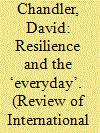

|
|
|
|
|
| Summary/Abstract |
Over the last decade there has been a shift towards critical understandings of ‘liberal peace’ approaches to international intervention, which argue that local culture holds the key to the effectiveness of peace interventions. In this ‘bottom-up’ approach, peace, reconciliation, and a ‘culture of law’ then become secondary effects of sociocultural norms and values. However, these liberal peace critiques have remained trapped in the paradox of liberal peace: the inability to go beyond the binaries of liberal universalism and cultural relativism. This understanding will be contrasted with the rise of ‘resilience’ approaches to intervention – which build on this attention to the particular context of application but move beyond this paradox through philosophical pragmatism and the focus on concrete social practices. This article clarifies the nature of this shift through the focus on the shifting understanding of international intervention to address the failings of the ‘war on drugs’ in the Americas.
|
|
|
|
|
|
|
|
|
|
|
|
|
|
|
|
| 20 |
ID:
164018
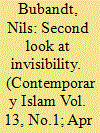

|
|
|
|
|
| Summary/Abstract |
The Arab concept al-ghayb refers to the hidden, the unseen, the invisible. The term encompasses a range of important phenomena in Islam and in the everyday experiences of Muslims. The dominion of the unseen (alam al-ghayb) includes those parts of reality that cannot be seen simply because they are covered by other visible objects. It also refers to those phenomena that by their nature cannot be perceived (e.g. the face or throne of God, paradise, hell, the past, or the future), as well as those objects that are blocked from view by one’s perspective (Drieskens 2006; Mittermaier 2011; Suhr 2013). Al-ghayb is important to the notion of barzakh, the intermediary realm between life and death; to the issue of veiling; to visions of deceased saints or dreams about the Prophet Muhammad as well as to the uncontrollable powers of jinn, angels, magic, the evil eye, and omens (Pandolfo 1997;
|
|
|
|
|
|
|
|
|
|
|
|
|
|
|
|
|
|
|
|
|